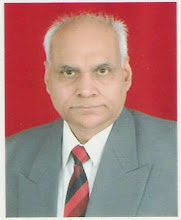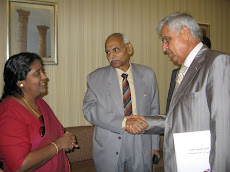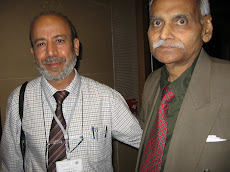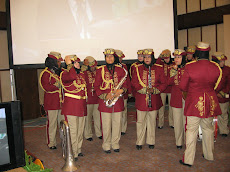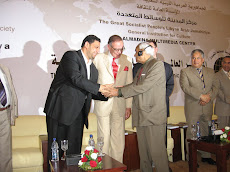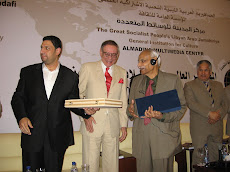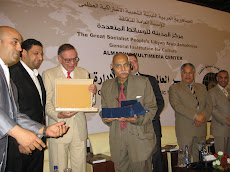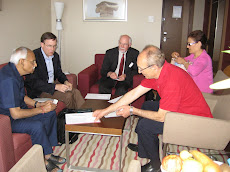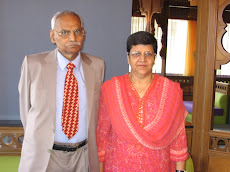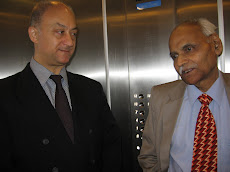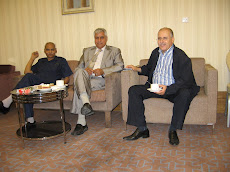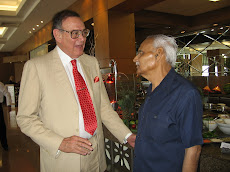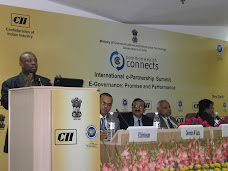India's National Knowledge Commission-2: Its Terms of Reference:
Knowledge Commission sans `knowledge worker' or `knowledge economy.'
India's National Knowledge Commission has the following terms of reference: The Commission will advise the Prime Minister on matters relating to institutions of knowledge production, knowledge use and knowledge dissemination.
The main terms of reference of the Commission, referred to as the "knowledge pentagon, include: (i) Building excellence in the educational system to meet the knowledge challenges of the 21st Century, (ii) Promote research in Science and Technology, (iii) Improve the management of institutions engaged in Intellectual
Property Rights, (iv) Promote knowledge applications in agriculture and industry, and (v) Promote the use of knowledge capabilities to make the government effective, transparent, accountable and public-oriented.
It will also explore ways in which knowledge can be made more widely accessible in India for maximum public benefit.
The danger to treat `knowledge' as a `commodity'(which it is not) to be produced (knowledge is created, not produced), used and disseminated (the natural order here is `dissemination' followed by `use' and not the other way) should be avoided by the knowledge commission. Moreover, in social and development context it is the `usable knowledge' (practical utility), which matters to the people and not the `knowledge for its own sake' (intellectual pursuit). When it has been proposed that the knowledge commission `will also explore ways in which knowledge can be made more widely accessible in India for maximum public benefit,' this term of reference presuppose existence of (usable) knowledge, which need not always be the case. The general perception is that not many 'knowledge institutions' (universities, research institutes / laboratories) have a ready storehouse of (usable) knowledge for dissemination among the people.
The main terms of reference of the knowledge commission can be grouped into five categories in brief: (i) excellence in educational system, (ii) research in science and technology, (iii) management of intellectual property rights (IPRs) institutions, (iv) knowledge applications in agriculture and industry, and (v) good governance.
These main terms of reference of the knowledge commission have two striking features. First, their inter-sectoral nature. Usually in government, such commissions or their lesser entities, (high powered) committees, are sectoral in nature, say, confined to a sector like education, agriculture, industry, etc. The multi-sectoral terms of reference of knowledge commission will require an expertise of a very high order for inter-sectoral co-ordination. The knowledge commission
as constituted at present does not have such an expertise though it does have a former member of the Indian administrative service who resigned from the service to pursue academic interests and till recently was vice chancellor, Delhi university and as such has to be treated more of a specialist rather than a generalist.
Secondly, and more importantly, India is perhaps the first and so far the only country in the world which has set up a (national) knowledge commission. This is a laudable step. The terms of reference of the knowledge commission, however, do not explicitly recognize the `knowledge worker' or `knowledge economy' or `knowledge society.' This is worrisome not only because many Indians are spearheading the
ongoing information revolution and India itself is a notable contributor to and beneficiary of the (new) `knowledge economy' but because creation of the national knowledge commission is a unique opportunity in which the knowledge commission can have a vision of Indian `knowledge society' based on `knowledge economy' and driven
by `knowledge workers' and prepare a plan of action to realize the vision in a definite time-frame. No commission, which calls itself, `knowledge' commission can afford to ignore these basic concepts, which are driving the ongoing information revolution worldwide.
Dr D.C.Misra
June 15, 2005
Wednesday, June 15, 2005
Friday, June 10, 2005
Illiterate people are using cybercafes in India, reports a research study
Illiterate people are using cybercafes in India without any special programs or applications for them, reports a research study. Haseloff,* a doctoral student at the University of Augsburg, Germany in his ongoing research study on "Cybercafes and their Potential as Community Development Tools in India" reports, among other things, that "it is a positive sign that currently some illiterate people are using cybercafes for a variety of reasons, without any special programs or applications for them being in place." His study, however, rejects the claim that cybercafes bridge the digital divide. According to him: "it appears that cybercafes according to the categories age, employment and education mostly serve the better-off groups (the young, the highly educated and the higher income groups). These findings confirm the results from the street survey, where Internet use could be measured only among the middle and upper-classes. Therefore, the theoretical assumption that cybercafes might help bridge the digital divide for the lowest SEC groups has to be rejected, at least at present." (Note: SEC= Socio-economic categories). His general finding is that "cybercafes play a significantly different role in India, compared to the role they play in the most developed countries. Whereas in developed countries, they are just an additional access point for people who already have access somewhere else, they seem to be highly important for the middle class in India, and therefore effectively help to bridge the digital divide for this group." Haseloff needs to be complimented for undertaking this policy-relevant study.Dr
D.C.Misra
June 10, 2005 _____________________________________________________________________________________
*Haseloff, Anikar M. (2005): Cybercafes and their Potential as Community Development Tools in India, The Journal of Community Informatics, Volume 1 Number 3 (2005), http://www.ci-journal.net/viewarticle.php?id=68&layout=html(accessed: June 10, 2005)
D.C.Misra
June 10, 2005 _____________________________________________________________________________________
*Haseloff, Anikar M. (2005): Cybercafes and their Potential as Community Development Tools in India, The Journal of Community Informatics, Volume 1 Number 3 (2005), http://www.ci-journal.net/viewarticle.php?id=68&layout=html(accessed: June 10, 2005)
Wednesday, June 08, 2005
Review of Virmani (2005): Institutions, Governance and Policy Reform
Occasional Paper Review: Review of Virmani, Arvind (2005): Institutions, Governance and Policy Reform: A Framework for Analysis, Economic and Political Weekly, Mumbai, India, May 28-June 4.
_____________________________________________________________________________________
Abstract:* “The literature on institutions and development has dealt with questions of grand design such as the Constitution, the rule of law (personal safety), property rights and informal rules embodied in culture. These are matters that happen on a time scale of a quarter/half century or more and can be thought of as the 'superstructure' of institutions. The quantitative work on institutions and growth has explored the linkage between these institutional issues and economic growth. The current paper focuses on what may be called the 'microstructure' of institutions, a smaller scale at which change can occur over a time frame of decades (or half decades). Among the issues that arise in this context are how changing institutions require changes in policies.”
Dr D.C.Misra
June 8, 2005
____________________________________________________________________________________
*Virmani, Arvind (2005): Institutions, Governance and Policy Reform: A Framework for Analysis, Economic and Political Weekly, Mumbai, India, May 28-June 4, http://www.epw.org.in/showArticles.php?root=2005&leaf=05&filename=8714&filetype=html
(accessed: June 8, 2005)
_____________________________________________________________________________________
Abstract:* “The literature on institutions and development has dealt with questions of grand design such as the Constitution, the rule of law (personal safety), property rights and informal rules embodied in culture. These are matters that happen on a time scale of a quarter/half century or more and can be thought of as the 'superstructure' of institutions. The quantitative work on institutions and growth has explored the linkage between these institutional issues and economic growth. The current paper focuses on what may be called the 'microstructure' of institutions, a smaller scale at which change can occur over a time frame of decades (or half decades). Among the issues that arise in this context are how changing institutions require changes in policies.”
Dr D.C.Misra
June 8, 2005
____________________________________________________________________________________
*Virmani, Arvind (2005): Institutions, Governance and Policy Reform: A Framework for Analysis, Economic and Political Weekly, Mumbai, India, May 28-June 4, http://www.epw.org.in/showArticles.php?root=2005&leaf=05&filename=8714&filetype=html
(accessed: June 8, 2005)
Sunday, June 05, 2005
Review of Torres et al. (2005): E-Government and E-Governance Developments in EU Cities
Review of Torres, Lourdes, Vicente Pina and Basilio Acerete (2005): E-Government and E-Governance Developments in EU Cities Reshaping Government Relation to Citizens
Torres et al. (2005)* report that "ICTs have not had a dramatic impact on the practical reality of present politics. The Internet represents an aid to good governance by increasing government transparency, efficiency, and customer-oriented service delivery, but it is not running, in most cases, as an important medium facilitating citizen consultation, policy discussion, or other aspects of citizen participation in the policymaking process." Their study shows that "technology is behaving as an enabler within pre-existingsocial structures and political functions. In the European continental countries the application of ICTs to service delivery has little effect on the traditional administration style of their countries. Furthermore, there is a systematic bias in local government ICT policy which not only confirms existing emphases upon service provision but also sustains and enhances it."
Their findings are based on a comprehensive study of the nature of e-governance initiatives by 35 cities with more than 500,000 inhabitants in 12 European countries - Austria, Belgium, France, Germany, Greece, Ireland, Italy, Luxembourg, The Netherlands, Portugal, Spain and the UK, which represent around 80 per cent of EU population. Their empirical survey focuses on "e-services and e-democracy together with the web maturity." The study was carried out "during the second half of 2003 and the first half of 2004and a range of 173 items of information were analysed, 67 services delivered through the Internet were identified and grouped according to the local public service classification carried out by Torres and Pina as well as 67 e-democracy features and 6 web maturity items.This is an important study, which should not be missed by any one interested in e-governance.
Torres et al. need to be complimented for not only undertaking this comprehensive cross-country study but for drawing clear conclusions which have important lessons of practical utility for e-governance policy-makers and implementers worldwide. Their conclusion, for example, "At present most e-government initiatives are still viewing people from a passive perspective -to whom something is given or from whom something is required-, and not as citizens" rings true as the state and citizens continue to co-exist in mutual discomfort. As the potential of e-governance continues to be unrealized worldwide, the study implies need for re-orientation of e-governance strategies to serve the citizens better. The authors rightly emphasise that "The jump fromadministratively oriented towards user-oriented organizations requires to give citizens the opportunity to influence and mould information which only transact level permits." E-Governance, it appears, has a long way to go.Dr
D.C.Misra
June 5, 2005
___________________________________________________________________________________
*Torres, Lourdes, Vicente Pina and Basilio Acerete (2005): E-Government and E-Governance Developments in EU Cities Reshaping Government Relation to Citizens, Zaragoza, Spain, University of Zaragoza, Faculty of Economics and Business Administration, Department of Accounting and Finance, Paper presented at the 28th European Accounting Association Annual Congress, Göteborg, May18-20, 2005, available http://www.uc3m.es/uc3m/dpto/EMP/seminar/torres.pdf(accessed: June 5, 2005)
Torres et al. (2005)* report that "ICTs have not had a dramatic impact on the practical reality of present politics. The Internet represents an aid to good governance by increasing government transparency, efficiency, and customer-oriented service delivery, but it is not running, in most cases, as an important medium facilitating citizen consultation, policy discussion, or other aspects of citizen participation in the policymaking process." Their study shows that "technology is behaving as an enabler within pre-existingsocial structures and political functions. In the European continental countries the application of ICTs to service delivery has little effect on the traditional administration style of their countries. Furthermore, there is a systematic bias in local government ICT policy which not only confirms existing emphases upon service provision but also sustains and enhances it."
Their findings are based on a comprehensive study of the nature of e-governance initiatives by 35 cities with more than 500,000 inhabitants in 12 European countries - Austria, Belgium, France, Germany, Greece, Ireland, Italy, Luxembourg, The Netherlands, Portugal, Spain and the UK, which represent around 80 per cent of EU population. Their empirical survey focuses on "e-services and e-democracy together with the web maturity." The study was carried out "during the second half of 2003 and the first half of 2004and a range of 173 items of information were analysed, 67 services delivered through the Internet were identified and grouped according to the local public service classification carried out by Torres and Pina as well as 67 e-democracy features and 6 web maturity items.This is an important study, which should not be missed by any one interested in e-governance.
Torres et al. need to be complimented for not only undertaking this comprehensive cross-country study but for drawing clear conclusions which have important lessons of practical utility for e-governance policy-makers and implementers worldwide. Their conclusion, for example, "At present most e-government initiatives are still viewing people from a passive perspective -to whom something is given or from whom something is required-, and not as citizens" rings true as the state and citizens continue to co-exist in mutual discomfort. As the potential of e-governance continues to be unrealized worldwide, the study implies need for re-orientation of e-governance strategies to serve the citizens better. The authors rightly emphasise that "The jump fromadministratively oriented towards user-oriented organizations requires to give citizens the opportunity to influence and mould information which only transact level permits." E-Governance, it appears, has a long way to go.Dr
D.C.Misra
June 5, 2005
___________________________________________________________________________________
*Torres, Lourdes, Vicente Pina and Basilio Acerete (2005): E-Government and E-Governance Developments in EU Cities Reshaping Government Relation to Citizens, Zaragoza, Spain, University of Zaragoza, Faculty of Economics and Business Administration, Department of Accounting and Finance, Paper presented at the 28th European Accounting Association Annual Congress, Göteborg, May18-20, 2005, available http://www.uc3m.es/uc3m/dpto/EMP/seminar/torres.pdf(accessed: June 5, 2005)
Monday, May 30, 2005
List: 2005 Top Ten Book Reviewers at Amazon.com
List: 2005 Top Ten Book Reviewers at Amazon.com
_____________________________________________________________________
1.Harriet Klausner (9,024) (56,245)
2.Lawrance M. Bernabo (The Zenith City: Duluth, MN United States)
(10,175 ) (55,935)
3.Donald Mitchell (2,599) (41,963)
4.Rebecca Johnson (2,773) (21,700)
5.Gail Cooke (TX, USA) (2,738) (16,534)
6.Joanna Daneman (Middletown, DE USA) ((1,1756) (20,022)
7.Barron Laycock (Temple, New Hampshire United States) (1,136) (31,
008)
8.Marc Ruby (Warren, MI USA) (1,320) (15,750)
9.E. A Solinas "ea_solinas" (MD USA) (2,275) (17,246)
10. Robert Morris (Dallas, Texas) (1,180) (12,579)
_____________________________________________________________________
Note: 1. Figures in first parentheses indicate the number of reviews
while the figures in second parentheses indicate the number of
helpful votes.
Source: Top Reviewrs, http://www.amazon.com/o/tg/cm/top-reviewers-
list/-/1/ref=cm_xx_hp_rev/104-3004000-7881534
Dr D.C.Misra
May 30, 2005
_____________________________________________________________________
1.Harriet Klausner (9,024) (56,245)
2.Lawrance M. Bernabo (The Zenith City: Duluth, MN United States)
(10,175 ) (55,935)
3.Donald Mitchell (2,599) (41,963)
4.Rebecca Johnson (2,773) (21,700)
5.Gail Cooke (TX, USA) (2,738) (16,534)
6.Joanna Daneman (Middletown, DE USA) ((1,1756) (20,022)
7.Barron Laycock (Temple, New Hampshire United States) (1,136) (31,
008)
8.Marc Ruby (Warren, MI USA) (1,320) (15,750)
9.E. A Solinas "ea_solinas" (MD USA) (2,275) (17,246)
10. Robert Morris (Dallas, Texas) (1,180) (12,579)
_____________________________________________________________________
Note: 1. Figures in first parentheses indicate the number of reviews
while the figures in second parentheses indicate the number of
helpful votes.
Source: Top Reviewrs, http://www.amazon.com/o/tg/cm/top-reviewers-
list/-/1/ref=cm_xx_hp_rev/104-3004000-7881534
Dr D.C.Misra
May 30, 2005
Books: Latest Arrivals: Eggers (2005):Government 2.0
Books: Latest Arrivals: Eggers, William D. (2005): Government 2.0: Using Technology to Improve Education, Cut Red Tape, Reduce Gridlock, and Enhance Democracy, Lanham, MD, Rowman and Littlefield, January ,304 pp, Cloth 0-7425-4175-4 $27.95
Check it at
http://www.rowmanlittlefield.com/Catalog/SingleBook.shtml?
command=Search&db=^DB/CATALOG.db&eqSKUdata=0742541754
Dr D.C.Misra
May 30, 2005.
Check it at
http://www.rowmanlittlefield.com/Catalog/SingleBook.shtml?
command=Search&db=^DB/CATALOG.db&eqSKUdata=0742541754
Dr D.C.Misra
May 30, 2005.
Website Watch: Policypointers
Policypointers is "an online facility created to enable those involved in government, academe and the media to gain rapid access to the research and conclusions of think tanks around the world." It believes that "policymakers and those who influence the policymaking function can frequently learn from the research done and the results achieved in countries other than their own. This belief is the rationale for creating this website." Though the site claims to be independent,it does not give its source of funding. Check it at
http://www.policypointers.org/page_4.html
Dr D.C.Misra
May 30, 2005
http://www.policypointers.org/page_4.html
Dr D.C.Misra
May 30, 2005
Books: Latest Arrivals: Goldsmith and Eggers (2004): Governing by Network
Books: Latest Arrivals: Goldsmith, Stephen and William
D.Eggers (2004): Governing by Network: The New Shape of the Public
Sector, Washington, D.C., Brookings Institution Press.
Copublished with Innovations in American Government, John F. Kennedy
School of Government, Harvard University.
c. 224pp, Cloth Text, 0-8157-3128-0, $44.95, Paper Text,
0-8157-3129-9, $18.95, Check details at
http://www.brookings.edu/press/books/governingbynetwork.htm
Dr D.C. Misra
May 30, 2005
D.Eggers (2004): Governing by Network: The New Shape of the Public
Sector, Washington, D.C., Brookings Institution Press.
Copublished with Innovations in American Government, John F. Kennedy
School of Government, Harvard University.
c. 224pp, Cloth Text, 0-8157-3128-0, $44.95, Paper Text,
0-8157-3129-9, $18.95, Check details at
http://www.brookings.edu/press/books/governingbynetwork.htm
Dr D.C. Misra
May 30, 2005
Wednesday, May 25, 2005
Who benefits more from eGov: Public authorities or citizens?
Public authorities. This is one of the findings of an important study* commissioned by European Union and carried out by Capgemini, Netherlands and TNO-Strategy, Technology and Policy, in its final report, final version.
The objective of the study was "to investigate if it is worth investing in eGovernment initiatives, and to identify the back office changes required for that." The study selected and studied in detail eight European exemplary public services ("eurexemps") from Denmark, Estonia, Finland, France, Germany, the Netherlands, Slovenia and Spain. The conclusion of the study is that "eGovernment does pay off and that back office changes are required to achieve
results."
The returns on e-government have been divided into seven categories:
1. Improved quality of information and information supply, 2. Reduction of process time, 3. Reduction of administrative burdens, 4. Cost reduction, 5. Improved service level, 6. Increased efficiency; and 7. Increased customer satisfaction. These seven returns are interconnected. The study is wound up by making a number of recommendations.
The results of the case studies show that "the use of ICT in the public sector can indeed be rewarding. All case studies show different degrees of improved service delivery (more digitised information, more transparency, more flexibility, faster delivery), and a reduction of transaction costs (reduction of process time,
saving on costs, more efficiency and -especially for businesses- a reduction of administrative burdens)."
The study also reports "different returns for customers on the one hand, and governmental/public authorities on the other hand: the public authorities themselves appear to benefit most from investments in e-government." The most striking result of this study, according to the report, "is that quick wins in particular can be obtained relatively easily, that is, without fundamental
organisational changes."
Dr D.C.Misra
May 25, 2005.
______________________________________________________________________
*European Public Administration Network (EPAN) (2004): Does E-
Government Pay Off? Capgemini, Netherlands and TNO- Strategy, Technology and Policy, Final report, Final version, December 6, 55 pp, available:
http://www.eupan.org/cms/repository/document/Does_e_gov_pay_off.zip
The objective of the study was "to investigate if it is worth investing in eGovernment initiatives, and to identify the back office changes required for that." The study selected and studied in detail eight European exemplary public services ("eurexemps") from Denmark, Estonia, Finland, France, Germany, the Netherlands, Slovenia and Spain. The conclusion of the study is that "eGovernment does pay off and that back office changes are required to achieve
results."
The returns on e-government have been divided into seven categories:
1. Improved quality of information and information supply, 2. Reduction of process time, 3. Reduction of administrative burdens, 4. Cost reduction, 5. Improved service level, 6. Increased efficiency; and 7. Increased customer satisfaction. These seven returns are interconnected. The study is wound up by making a number of recommendations.
The results of the case studies show that "the use of ICT in the public sector can indeed be rewarding. All case studies show different degrees of improved service delivery (more digitised information, more transparency, more flexibility, faster delivery), and a reduction of transaction costs (reduction of process time,
saving on costs, more efficiency and -especially for businesses- a reduction of administrative burdens)."
The study also reports "different returns for customers on the one hand, and governmental/public authorities on the other hand: the public authorities themselves appear to benefit most from investments in e-government." The most striking result of this study, according to the report, "is that quick wins in particular can be obtained relatively easily, that is, without fundamental
organisational changes."
Dr D.C.Misra
May 25, 2005.
______________________________________________________________________
*European Public Administration Network (EPAN) (2004): Does E-
Government Pay Off? Capgemini, Netherlands and TNO- Strategy, Technology and Policy, Final report, Final version, December 6, 55 pp, available:
http://www.eupan.org/cms/repository/document/Does_e_gov_pay_off.zip
Friday, May 13, 2005
Review of Bannister (2004): Deep E-Government
Frank Bannister* of Trinity College, Dublin, is critical of benchmarking e-government stating that “Many of the benchmarks on the list use facile or superficial metrics such as the percentage of GDP spent on e-government, the number of on-line services for citizens or the percentage of citizens that have visited a government web site.” In his view “Much of what is described as e-government is indeed superficial” and “Much of what is not superficial is not considered to be e-government.” He therefore advances the concept of “Deep E-Government” concerned with “ the core functions of government and of administration.” Proposing an “onion model” of e-government and stating that “deep e-government” is concerned with the three inner layers of administrative core, agencies and government (the other two layers being “wider public” and “commercial sector”), his conceptualization of e-government encompasses two types of deep e-government: (i) Transformative e-government and (ii) End-to-end e-government.
Illustrated with practical examples, he is of the view that “the type of deep and more reflective discussion that is to be found in the informatization literature of the 1980s and 1990s seems to have been overwhelmed by discussions of such things as how to improve web-site effectiveness, measure e-government penetration or bridge the digital divide.” Accordingly he makes a call for “more consideration of(or even a return to!) deeper conceptual issues and for innovative thinking about how the nature of governance itself can be moderated by technology.” He has proposed several lines of enquiry and his recommendation that “we need to move beyond the web sites and regain an historical and holistic perspective” will find many supporters, including this reviewer. A very well written and thought-provoking contribution, any one interested in e-government will benefit by reading it, and perhaps more importantly, thinking over various issues so very pertinently raised by Bannister.
Dr D.C.Misra
New Delhi, India
May 13, 2005.
_____________________________________________________________________________________
*Bannister, Frank (2004): Deep E-Government, EGPA 2004 Annual Conference, September 1-4, 2004, Ljubljana, Slovenia, available: http://www.fu.uni-lj.si/egpa2004/html/sg1/Bannister.pdf (accessed: May 13, 2005).
Illustrated with practical examples, he is of the view that “the type of deep and more reflective discussion that is to be found in the informatization literature of the 1980s and 1990s seems to have been overwhelmed by discussions of such things as how to improve web-site effectiveness, measure e-government penetration or bridge the digital divide.” Accordingly he makes a call for “more consideration of(or even a return to!) deeper conceptual issues and for innovative thinking about how the nature of governance itself can be moderated by technology.” He has proposed several lines of enquiry and his recommendation that “we need to move beyond the web sites and regain an historical and holistic perspective” will find many supporters, including this reviewer. A very well written and thought-provoking contribution, any one interested in e-government will benefit by reading it, and perhaps more importantly, thinking over various issues so very pertinently raised by Bannister.
Dr D.C.Misra
New Delhi, India
May 13, 2005.
_____________________________________________________________________________________
*Bannister, Frank (2004): Deep E-Government, EGPA 2004 Annual Conference, September 1-4, 2004, Ljubljana, Slovenia, available: http://www.fu.uni-lj.si/egpa2004/html/sg1/Bannister.pdf (accessed: May 13, 2005).
Thursday, April 07, 2005
Review of Mandal (2005a, 2005 b): Public Service - I and II, The Statesman, New Delhi, April 6-7, 2005
Review of Mandal (2005a, 2005 b): Public Service - I and II, The Statesman, New Delhi, April 6-7, 2005
In these two successive articles* Mr. Mandal, a former member of the Indian Civil Service, covers a very wide range of issues including providing an historical evolution of civil services in India. Noting the deteriorating standards of the Indian Administrative Service, he calls for market-driven civil services in India pleading for lateral entry to the civil services. Missed from these two-well written articles is the contribution eGov can make to good governance in the 21st century.
Dr D.C.Misra
April 7, 2005
_____________________________________________________________________________________
*Mandal, Debaki Nandan (2005a): Public Service-I: Bureaucrats Drift Towards Negativism And Mediocrity, The Statesman, New Delhi, April 6, 2005, Wednesday, available: http://www.thestatesman.net/page.arcview.php?date=2005-04-06&usrsess=1&clid=3&id=101447, and
Mandal, Debaki Nandan (2005b): Public Service-II: Need For A Market-Driven Approach, The Statesman, New Delhi, April 7, 2005, Thursday, available: http://www.thestatesman.net/page.news.php?clid=3&theme=&usrsess=1&id=73354
In these two successive articles* Mr. Mandal, a former member of the Indian Civil Service, covers a very wide range of issues including providing an historical evolution of civil services in India. Noting the deteriorating standards of the Indian Administrative Service, he calls for market-driven civil services in India pleading for lateral entry to the civil services. Missed from these two-well written articles is the contribution eGov can make to good governance in the 21st century.
Dr D.C.Misra
April 7, 2005
_____________________________________________________________________________________
*Mandal, Debaki Nandan (2005a): Public Service-I: Bureaucrats Drift Towards Negativism And Mediocrity, The Statesman, New Delhi, April 6, 2005, Wednesday, available: http://www.thestatesman.net/page.arcview.php?date=2005-04-06&usrsess=1&clid=3&id=101447, and
Mandal, Debaki Nandan (2005b): Public Service-II: Need For A Market-Driven Approach, The Statesman, New Delhi, April 7, 2005, Thursday, available: http://www.thestatesman.net/page.news.php?clid=3&theme=&usrsess=1&id=73354
Friday, March 25, 2005
IJEG, 1(1), January-March 2005: OPR:Review of Madon et al. (2004): Implementing Property Tax Reforms in Bangalore
INDIAN JOURNAL OF E-GOVERNANCE, Volume I Number 1, January-March 2005: OPR: Review of Madon et al. (2004) : Implementing Property Tax Reforms in Bangalore.....
INDIAN JOURNAL OF E-GOVERNANCE, Volume 1 Number 1 Occasional Paper Review: Madon, Shirin, Sundeep Sahay and Jyotsna Sahay (2004): Implementing Property Tax Reforms in Bangalore: An Actor Network Perspective......
In this paper* Madon et al. report the result of their study of the property tax reforms process in Bangalore, and drawing upon the Actor Network Perspective on translations, argue that such a perspective helps to go beyond studying innovation processes through the lens of ‘technology diffusion’ and provides far more interesting and insightful perspective of ‘technology translation.’ (p-1). Callon described four moments – translation, interessernment, enrolment and mobilization - to represent the sociology of translation. The authors have conceptualized information flows as “an abstraction of a complex heterogeneous network comprising of work practices, artifacts like paper files and legers, the buildings through which files are carried around, people involved, and organizational procedures and informal practices that shape the flow of information.’ (p-12). Interestingly, the authors cite the late Everett M. Rogers’s 1962 work on diffusion of innovations though the work went through several revisions as reflected in several later and revised editions.
Dr D.C.Misra
March 25, 2005
___________________________________________________________________
* Madon, Shirin, Sundeep Sahay and Jyotsna Sahay (2004): Implementing Property Tax Reforms in Bangalore: An Actor Network Perspective, London, London School of Economics and Political Science, Department of Information Systems, Working Paper Series Number 129, December 2003, 37 pp, available http://is.lse.ac.uk/wp/pdf/WP129.PDF (accessed: March 25, 2005).
INDIAN JOURNAL OF E-GOVERNANCE, Volume 1 Number 1 Occasional Paper Review: Madon, Shirin, Sundeep Sahay and Jyotsna Sahay (2004): Implementing Property Tax Reforms in Bangalore: An Actor Network Perspective......
In this paper* Madon et al. report the result of their study of the property tax reforms process in Bangalore, and drawing upon the Actor Network Perspective on translations, argue that such a perspective helps to go beyond studying innovation processes through the lens of ‘technology diffusion’ and provides far more interesting and insightful perspective of ‘technology translation.’ (p-1). Callon described four moments – translation, interessernment, enrolment and mobilization - to represent the sociology of translation. The authors have conceptualized information flows as “an abstraction of a complex heterogeneous network comprising of work practices, artifacts like paper files and legers, the buildings through which files are carried around, people involved, and organizational procedures and informal practices that shape the flow of information.’ (p-12). Interestingly, the authors cite the late Everett M. Rogers’s 1962 work on diffusion of innovations though the work went through several revisions as reflected in several later and revised editions.
Dr D.C.Misra
March 25, 2005
___________________________________________________________________
* Madon, Shirin, Sundeep Sahay and Jyotsna Sahay (2004): Implementing Property Tax Reforms in Bangalore: An Actor Network Perspective, London, London School of Economics and Political Science, Department of Information Systems, Working Paper Series Number 129, December 2003, 37 pp, available http://is.lse.ac.uk/wp/pdf/WP129.PDF (accessed: March 25, 2005).
Thursday, February 24, 2005
INDIAN JOURNAL OF E-GOVERNANCE, Volume I Number 1, January-March 2005
INDIAN JOURNAL OF E-GOVERNANCE, Volume I Number 1, January-March 2005
______________________________________________________________________
eGov Website: Request for Proposal - A Portal for District Magistratein India (For the recod)
The District Magistrate, also called District Collector and / orDistrict Officer, holds a key position in India's administrativeset-up. In a laudable attempt, Department of Personnel and Training,Ministry of Personnel, Public Grievances and Pensions, Government ofIndia proposes to set up a portal for the District Magistrate toenable him to have quick access to information and advice. TheDepartment of Personnel and Training invited proposals from theinterested parties. Check the document at
http://persmin.nic.in/otraining/rfp.pdf (accessed: February 24, 2005).
The last date for submission of proposals was February 11, 2005. Thismessage, therefore, is being posted for record only in academic interest.
Dr D.C.Misra
February 24, 2005.
______________________________________________________________________
eGov Website: Request for Proposal - A Portal for District Magistratein India (For the recod)
The District Magistrate, also called District Collector and / orDistrict Officer, holds a key position in India's administrativeset-up. In a laudable attempt, Department of Personnel and Training,Ministry of Personnel, Public Grievances and Pensions, Government ofIndia proposes to set up a portal for the District Magistrate toenable him to have quick access to information and advice. TheDepartment of Personnel and Training invited proposals from theinterested parties. Check the document at
http://persmin.nic.in/otraining/rfp.pdf (accessed: February 24, 2005).
The last date for submission of proposals was February 11, 2005. Thismessage, therefore, is being posted for record only in academic interest.
Dr D.C.Misra
February 24, 2005.
Wednesday, February 23, 2005
INDIAN JOURNAL OF E-GOVERNANCE, January-March 2005, Volume I Number 1
INDIAN JOURNAL OF E-GOVERNANCE, January-March 2005, Volume I Number 1
______________________________________________________________________
Forthcoming Event: Hawaii International Conference on System Sciences (HICSS-39), January 4-7, 2006, Kauai, Hawaii
This 4-day international event offers the following tracks, including two new tracks on E-Government and Knowledge Management Systems, and a number of “mini-tracks.”
·Collaboration Systems and Technology
·Decision Technologies for Management
·Digital Media: Content and Management
·E-Government
·Information Technology in Health Care
·Internet and the Digital Economy
·Knowledge Management Systems
·Organizational Systems and Technology
·Software Technology
Check them at
http://www.hicss.hawaii.edu/HICSS39/apahome39.htm
Of particular interest to us is the "E-Government" track. Do check it, as it offers a number of very stimulating topics, at
http://www.hicss.hawaii.edu/HICSS39/fegcfp.htm
Dr D.C.Misra
February 23, 2005.
______________________________________________________________________
Forthcoming Event: Hawaii International Conference on System Sciences (HICSS-39), January 4-7, 2006, Kauai, Hawaii
This 4-day international event offers the following tracks, including two new tracks on E-Government and Knowledge Management Systems, and a number of “mini-tracks.”
·Collaboration Systems and Technology
·Decision Technologies for Management
·Digital Media: Content and Management
·E-Government
·Information Technology in Health Care
·Internet and the Digital Economy
·Knowledge Management Systems
·Organizational Systems and Technology
·Software Technology
Check them at
http://www.hicss.hawaii.edu/HICSS39/apahome39.htm
Of particular interest to us is the "E-Government" track. Do check it, as it offers a number of very stimulating topics, at
http://www.hicss.hawaii.edu/HICSS39/fegcfp.htm
Dr D.C.Misra
February 23, 2005.
Tuesday, February 15, 2005
eGov: A Report on a Brainstorming Session on e-Governance on February 14, 2005 at JNU, New Delhi
eGov:
A Report on a Brainstorming Session on e-Governance on February 14, 2005 from 10 a.m. to 2-30 p.m. at the Centre for the Study of Law and Governance (CSLG), Jawaharlal Nehru University (JNU), New Delhi
A REPORT
Theme: e-Governance: Cementing Communities, Dispersing Services
This was a well-attended brainstorming session on e-Governance very competently conceptualized, organized and summed up by Dr Amita Singh, Associate Professor at the Centre. The session was organized along five sub-themes: 1. Problems in urgent need of e-treatment, 2. Perceived solutions, 3. Technology / systems Applications, 4. Democratic imperatives, and 5. Theoretical construction.
1. Problems in urgent need of e-treatment:
Dr Roopmanjari Ghosh of School of Physical Sciences, JNU highlighted some of the unique characteristics of information and communication technologies (ICTs) and spelled out specific areas where ICTs could be utilized.
Prof Alok Bhattacharjee of Bioinformatics Centre, JNU specified a wide variety of fields like genomic, drugs and medicines, hospital administration, tax administration and e-learning where ICTs could be deployed due to availability of new data mining tools and new search methods.
2. Perceived solutions
Dr V.S.Mathur, Director General, Income-Tax, described the various steps taken by his department to computerize the income tax administration, highlighting the service it was providing to tax-payers.
Dr Rajat K. Baisya of Management Department, IIT, Delhi, noted the high percentage of failure of eGov projects and pointed out the lack of bureaucratic commitment to community information center (CIC) project in north-east India.
Dr Norio Kondo, a Japanese visiting scholar, described the Juki-Net, the basic resident register network (RRN) system in Japan serving as a personal authentication system and highlighted laws protecting personal information.
3. Technology / systems Applications
Prof Shatendra Sharma of University Science Instrumentation Centre, JNU, provided an overview of various tools available for utilization in e-governance and highlighted the utilization of e-tools for efficient public service delivery.
Mr Vinnie Mehta of Manufacturers Association for Information Technology (MAIT), New Delhi pointed out to the multiplicity of agencies involved in the implementation of eGov and highlighted inadequate funds with the Ministry of Panchayati Raj for ePanchayats.
Mr Upendra Giri of Project Management Institute (PMI) pointed out to the need of utilization of project management techniques to the e-government projects and highlighted the work done by the PMI.
4. Democratic imperatives
Mr Navin Mandava of Centre for Civil Society (www.ccsindia.org), a New Delhi-based think tank, highlighted the need to enact a ‘dutyto publish” legislation instead of the present Right toInformation Act (RIA), which placed an onus on the citizens to seek information.
Participant’s comments / suggestions
Mr Vikas Kanungo, Chairman and Secretary General, Society for Promotion of e-Governance, New Delhi, sought information about database algorithms in cases of data mining of large databases involved in e-government projects.
The undersigned, an Independent eGov Adviser and Consultant, noted the existence of problems on both sides of hyphen connecting“e” with “Gov,” and highlighted the need to keep the citizen at the centre stage of any eGov project formulation and implementation.
5. Theoretical construction.
Prof Kuldeep Mathur, the Chairperson, concluding the session, observed that “eGov” was just a tool and cannot be asubstitute to “Governance.” eGov will spread in society as a“ripple effect.” Once people got “the taste of blood” (of eGov), change will get institutionalized and get legitimacy.
Summing Up
Summing up the proceedings, Dr Amita Singh observed that we have always been e-governed (by way of using e-tools like telephones, etc.) but many things are required to be done in eGov, particularly in restructuring organizations and knowledge management.
The session ended with a vote of thanks to the chair.
The Centre, particularly Dr Amita Singh, Associate Professor, and its chairperson, Dr Dr Amit Prakash, need to be congratulated for convening the session.
Disclaimer: This is a brief, almost sketchy, record of proceedings which is being posted here for the benefit of those who could not attend the session but may like to know as to what happened in the "brainstorming session" on eGov. For the formal and authoritative proceedings, kindly contact the Centre.
Dr D.C.Misra
February 15, 2005.
A Report on a Brainstorming Session on e-Governance on February 14, 2005 from 10 a.m. to 2-30 p.m. at the Centre for the Study of Law and Governance (CSLG), Jawaharlal Nehru University (JNU), New Delhi
A REPORT
Theme: e-Governance: Cementing Communities, Dispersing Services
This was a well-attended brainstorming session on e-Governance very competently conceptualized, organized and summed up by Dr Amita Singh, Associate Professor at the Centre. The session was organized along five sub-themes: 1. Problems in urgent need of e-treatment, 2. Perceived solutions, 3. Technology / systems Applications, 4. Democratic imperatives, and 5. Theoretical construction.
1. Problems in urgent need of e-treatment:
Dr Roopmanjari Ghosh of School of Physical Sciences, JNU highlighted some of the unique characteristics of information and communication technologies (ICTs) and spelled out specific areas where ICTs could be utilized.
Prof Alok Bhattacharjee of Bioinformatics Centre, JNU specified a wide variety of fields like genomic, drugs and medicines, hospital administration, tax administration and e-learning where ICTs could be deployed due to availability of new data mining tools and new search methods.
2. Perceived solutions
Dr V.S.Mathur, Director General, Income-Tax, described the various steps taken by his department to computerize the income tax administration, highlighting the service it was providing to tax-payers.
Dr Rajat K. Baisya of Management Department, IIT, Delhi, noted the high percentage of failure of eGov projects and pointed out the lack of bureaucratic commitment to community information center (CIC) project in north-east India.
Dr Norio Kondo, a Japanese visiting scholar, described the Juki-Net, the basic resident register network (RRN) system in Japan serving as a personal authentication system and highlighted laws protecting personal information.
3. Technology / systems Applications
Prof Shatendra Sharma of University Science Instrumentation Centre, JNU, provided an overview of various tools available for utilization in e-governance and highlighted the utilization of e-tools for efficient public service delivery.
Mr Vinnie Mehta of Manufacturers Association for Information Technology (MAIT), New Delhi pointed out to the multiplicity of agencies involved in the implementation of eGov and highlighted inadequate funds with the Ministry of Panchayati Raj for ePanchayats.
Mr Upendra Giri of Project Management Institute (PMI) pointed out to the need of utilization of project management techniques to the e-government projects and highlighted the work done by the PMI.
4. Democratic imperatives
Mr Navin Mandava of Centre for Civil Society (www.ccsindia.org), a New Delhi-based think tank, highlighted the need to enact a ‘dutyto publish” legislation instead of the present Right toInformation Act (RIA), which placed an onus on the citizens to seek information.
Participant’s comments / suggestions
Mr Vikas Kanungo, Chairman and Secretary General, Society for Promotion of e-Governance, New Delhi, sought information about database algorithms in cases of data mining of large databases involved in e-government projects.
The undersigned, an Independent eGov Adviser and Consultant, noted the existence of problems on both sides of hyphen connecting“e” with “Gov,” and highlighted the need to keep the citizen at the centre stage of any eGov project formulation and implementation.
5. Theoretical construction.
Prof Kuldeep Mathur, the Chairperson, concluding the session, observed that “eGov” was just a tool and cannot be asubstitute to “Governance.” eGov will spread in society as a“ripple effect.” Once people got “the taste of blood” (of eGov), change will get institutionalized and get legitimacy.
Summing Up
Summing up the proceedings, Dr Amita Singh observed that we have always been e-governed (by way of using e-tools like telephones, etc.) but many things are required to be done in eGov, particularly in restructuring organizations and knowledge management.
The session ended with a vote of thanks to the chair.
The Centre, particularly Dr Amita Singh, Associate Professor, and its chairperson, Dr Dr Amit Prakash, need to be congratulated for convening the session.
Disclaimer: This is a brief, almost sketchy, record of proceedings which is being posted here for the benefit of those who could not attend the session but may like to know as to what happened in the "brainstorming session" on eGov. For the formal and authoritative proceedings, kindly contact the Centre.
Dr D.C.Misra
February 15, 2005.
Saturday, February 12, 2005
Editorial: Task Force on E-Governance: Hyphenating “E” with “Governance”
Editorial:
Task Force on E-Governance: Hyphenating “E” with “Governance:” There are Serious Issues on Both Sides of Hyphen
Ravichandran informs us, and thanks to him as no one else has informed us, that a task force to speed up e-governance in states has been set up by Government of India on February 7, 2005. According to him, “In order to re-engineer the government processes and to develop state-wide solution framework options to enhance the interoperability among state governments, the Department of Administrative Reforms & Pensions and Grievances (DAR&PG) and Department of Information Technology (DIT) together set-up a taskforce for e-governance process engineering and scaleable solutions framework on Monday.”
He further states that: “Leading IT majors, management institutions and consultancy majors like the Indian Institute of Management, Calcutta, (IIM-C); Oracle; Hewlett Packard; PriceWaterhouseCoopers; Intel; Redhat and Liqvid have been selected as the members of the taskforce.”
Ravichandran further informs us that a steering committee too has been set up. In his words: “The steering committee of the taskforce consists of the director of DAR&PG, DIT and one faculty member of IIM-C and one representative from Oracle-HP e-governance Centre of Excellence, according to Oracle.”
The issue is of very considerable importance to us. The issues facing e-governance in India require to be addressed urgently and that too from different perspectives if the potential of e-governance in India is proposed to be realized for the benefit of the citizens. Ravichandran reports:
“In a communication, Oracle said that the taskforce will seek to complete the process re-engineering done by the Centre, state and local governments and also suggest approaches, tools and methodology for re-engineering of government processes. In addition, the taskforce will develop state-wide solution framework tools that enhance interoperability while allowing governments to start encompassing the following:
State-wide government call centre network;
• Kiosk-based delivery of government services or alternative front-end facilitation centres;
• Data-centric view of transactions with citizens seamlessly integrating multiple government agency and stakeholder roles and functions;
• Exploring alternative delivery channels leveraging on wireless and emerging m-governance capabilities; and
• Emergency response and disaster management information system.
According to Oracle, the taskforce will also be responsible for development of a course in cyber law which will address issues of IP, licences, re-purposing, re-use of code and the IT Act 2000. It will also create a digital repository of guidelines for outsourcing and comparative analysis of the various approaches.”
Apparently a tall order has been placed on the task force. Different issues mentioned in the above report not only deserve deliberation but expertise, as there are many “frontier” areas like cyber law where there is no benefit of precedence. Also, the field is fraught with technical issues like inter-operability and open versus proprietary offerings. Moreover, hyphenating “e” with “governance” has serious issues on both sides of the hyphen, that is, within “e” domain as well as in the domain of “governance” which require to be sorted out. Above all, citizen’s perspective needs to be incorporated in the task force. This should not be done by proxy but by providing direct representation of citizens on the task force. After all, e-governance is for the citizens. Is it not?
Dr D.C.Misra
February 11, 2005
______________________________________________________________
*Ravichandran, R., (2005); Taskforce set up to speed up e-governance in states,
The Financial Express, February 8, Tuesday, Net edition, available http://www.financialexpress.com/fe_full_story.php?content_id=81935
(accessed: February 11, 2005) (Dateline: Hyderabad, February 7, 2005)
(Source: http://in.groups.yahoo.com/group/cyberquiz/message/443)
Task Force on E-Governance: Hyphenating “E” with “Governance:” There are Serious Issues on Both Sides of Hyphen
Ravichandran informs us, and thanks to him as no one else has informed us, that a task force to speed up e-governance in states has been set up by Government of India on February 7, 2005. According to him, “In order to re-engineer the government processes and to develop state-wide solution framework options to enhance the interoperability among state governments, the Department of Administrative Reforms & Pensions and Grievances (DAR&PG) and Department of Information Technology (DIT) together set-up a taskforce for e-governance process engineering and scaleable solutions framework on Monday.”
He further states that: “Leading IT majors, management institutions and consultancy majors like the Indian Institute of Management, Calcutta, (IIM-C); Oracle; Hewlett Packard; PriceWaterhouseCoopers; Intel; Redhat and Liqvid have been selected as the members of the taskforce.”
Ravichandran further informs us that a steering committee too has been set up. In his words: “The steering committee of the taskforce consists of the director of DAR&PG, DIT and one faculty member of IIM-C and one representative from Oracle-HP e-governance Centre of Excellence, according to Oracle.”
The issue is of very considerable importance to us. The issues facing e-governance in India require to be addressed urgently and that too from different perspectives if the potential of e-governance in India is proposed to be realized for the benefit of the citizens. Ravichandran reports:
“In a communication, Oracle said that the taskforce will seek to complete the process re-engineering done by the Centre, state and local governments and also suggest approaches, tools and methodology for re-engineering of government processes. In addition, the taskforce will develop state-wide solution framework tools that enhance interoperability while allowing governments to start encompassing the following:
State-wide government call centre network;
• Kiosk-based delivery of government services or alternative front-end facilitation centres;
• Data-centric view of transactions with citizens seamlessly integrating multiple government agency and stakeholder roles and functions;
• Exploring alternative delivery channels leveraging on wireless and emerging m-governance capabilities; and
• Emergency response and disaster management information system.
According to Oracle, the taskforce will also be responsible for development of a course in cyber law which will address issues of IP, licences, re-purposing, re-use of code and the IT Act 2000. It will also create a digital repository of guidelines for outsourcing and comparative analysis of the various approaches.”
Apparently a tall order has been placed on the task force. Different issues mentioned in the above report not only deserve deliberation but expertise, as there are many “frontier” areas like cyber law where there is no benefit of precedence. Also, the field is fraught with technical issues like inter-operability and open versus proprietary offerings. Moreover, hyphenating “e” with “governance” has serious issues on both sides of the hyphen, that is, within “e” domain as well as in the domain of “governance” which require to be sorted out. Above all, citizen’s perspective needs to be incorporated in the task force. This should not be done by proxy but by providing direct representation of citizens on the task force. After all, e-governance is for the citizens. Is it not?
Dr D.C.Misra
February 11, 2005
______________________________________________________________
*Ravichandran, R., (2005); Taskforce set up to speed up e-governance in states,
The Financial Express, February 8, Tuesday, Net edition, available http://www.financialexpress.com/fe_full_story.php?content_id=81935
(accessed: February 11, 2005) (Dateline: Hyderabad, February 7, 2005)
(Source: http://in.groups.yahoo.com/group/cyberquiz/message/443)
Article Review: Bhattacharjee (2005): Reading English August
Article Review-17: Bhattacharjee, Jay (2005): Reading English August: Flatulent Babus Need To Be Accountable, The Times of India, New Delhi, February 11, Friday, p-18, edit page.
_____________________________________________________________________
In response to a civil servant’s call for inculcating “a set of core values,” Bhattacharjee* says that that the Indian civil servants do have a “deeply ingrained set of core values, namely,
self-aggrandisement, turf protection, non-accountability and a quasi-divine right to rule over hapless citizens.” He, therefore suggests safeguards “like accountability, performance monitoring, compensation to linked to efficiency and citizen’s redress against bureaucratic malfunctioning.”
This is a familiar diatribe against the civil servants. The author even challenges some protection civil servants have against anonymous, false or frivolous complaints and many careers are known to have been ruined on this account alone. The suggestions made by the author are also in place. However, the writer is right in saying that the value of “public service” among the civil servants is missing. The question to be asked then is: “What can be done to improve the public service delivery for which the public has a very poor experience, often bordering on harassment? The answer may thus lie in addressing the question of public service delivery and e-government can be one promising way.
Dr D.C.Misra
February 12, 2005.
_____________________________________________________________________
*Bhattacharjee, Jay (2005): Reading English August: Flatulent Babus Need To Be Accountable, The Times of India, New Delhi, February 11, Friday, p-18, edit page,
http://epaperdaily.timesofindia.com/Daily/skins/TOI/navigator.asp? Daily=CAP (accessed: February 12, 2005).
_____________________________________________________________________
In response to a civil servant’s call for inculcating “a set of core values,” Bhattacharjee* says that that the Indian civil servants do have a “deeply ingrained set of core values, namely,
self-aggrandisement, turf protection, non-accountability and a quasi-divine right to rule over hapless citizens.” He, therefore suggests safeguards “like accountability, performance monitoring, compensation to linked to efficiency and citizen’s redress against bureaucratic malfunctioning.”
This is a familiar diatribe against the civil servants. The author even challenges some protection civil servants have against anonymous, false or frivolous complaints and many careers are known to have been ruined on this account alone. The suggestions made by the author are also in place. However, the writer is right in saying that the value of “public service” among the civil servants is missing. The question to be asked then is: “What can be done to improve the public service delivery for which the public has a very poor experience, often bordering on harassment? The answer may thus lie in addressing the question of public service delivery and e-government can be one promising way.
Dr D.C.Misra
February 12, 2005.
_____________________________________________________________________
*Bhattacharjee, Jay (2005): Reading English August: Flatulent Babus Need To Be Accountable, The Times of India, New Delhi, February 11, Friday, p-18, edit page,
http://epaperdaily.timesofindia.com/Daily/skins/TOI/navigator.asp? Daily=CAP (accessed: February 12, 2005).
Thursday, February 10, 2005
Occasional Paper Review: Okot-Uma (2004): Roadmap to eGov Implementation
Occasional Paper Review -17: Okot-Uma, Rogers W'O(2004): The Roadmap to eGovernance Implementation: SelectedPerspectives
As the title of the paper* indicates, it provides selected perspectives on a roadmap to eGovernance suggested by the authorbased on his experiences in the Commonwealth member countries. He lists 4 milestones: (i) Stakeholder Statement of Requirements –the Expectations, (ii) Baseline Assessment: An assessment of the`status quo', of all pertinent `entities' and processes, (iii) Blue Print for eGovernance: An eGovernanceMasterPlan (eGMP) – Aggregation Scenarios, with Strategic Optionsand an Action plan, essentially arising from the discrepancies between the Expectations and the Baseline Assessment, and (iv)Implementation: One mode of approach to eGovernance implementation is its treatment as a combined Project Management Process and a Change Management Process for eGovernance (pp 1-2).
After describing the technical aspects of creating national information infrastructure (NII) within the framework of global information infrastructure (GII), Okat-Uma also presents a taxonomyof levels of evolution of eGovernance and implications for integration of Government services thus: (i) Level 0: Internalising,(ii) Level 1: Informing, (iii) Level 2: Interacting, (iv) Level 3:Transacting, (v) Level 4: Integrating, and (vi) Level 5: Transforming(pp 15-16), finally providing a Blueprint for eGovernance: A National eGovernance Masterplan ( eGMP). The author provides interesting perspectives on eGovernance. It is a useful reading for any one interested in eGovernance.
Dr D.C.Misra
New Delhi, India
February 10, 2005
______________________________________________________________________ *Okot-Uma, Rogers W'O (2004): The Roadmap to eGovernanceImplementation:Selected Perspectives, Presented at a CommonwealthRegional Pacific Workshop on Law and Technology, 1 – 5 November2004, Wellington, New Zealand, 33 pp, available:http://www.rileyis.com/publications/research_papers/guest/Roadmap2eGov.pdf (accessed: February 10, 2005)
(Source: http://in.groups.yahoo.com/group/cyberquiz/message/438)
As the title of the paper* indicates, it provides selected perspectives on a roadmap to eGovernance suggested by the authorbased on his experiences in the Commonwealth member countries. He lists 4 milestones: (i) Stakeholder Statement of Requirements –the Expectations, (ii) Baseline Assessment: An assessment of the`status quo', of all pertinent `entities' and processes, (iii) Blue Print for eGovernance: An eGovernanceMasterPlan (eGMP) – Aggregation Scenarios, with Strategic Optionsand an Action plan, essentially arising from the discrepancies between the Expectations and the Baseline Assessment, and (iv)Implementation: One mode of approach to eGovernance implementation is its treatment as a combined Project Management Process and a Change Management Process for eGovernance (pp 1-2).
After describing the technical aspects of creating national information infrastructure (NII) within the framework of global information infrastructure (GII), Okat-Uma also presents a taxonomyof levels of evolution of eGovernance and implications for integration of Government services thus: (i) Level 0: Internalising,(ii) Level 1: Informing, (iii) Level 2: Interacting, (iv) Level 3:Transacting, (v) Level 4: Integrating, and (vi) Level 5: Transforming(pp 15-16), finally providing a Blueprint for eGovernance: A National eGovernance Masterplan ( eGMP). The author provides interesting perspectives on eGovernance. It is a useful reading for any one interested in eGovernance.
Dr D.C.Misra
New Delhi, India
February 10, 2005
______________________________________________________________________ *Okot-Uma, Rogers W'O (2004): The Roadmap to eGovernanceImplementation:Selected Perspectives, Presented at a CommonwealthRegional Pacific Workshop on Law and Technology, 1 – 5 November2004, Wellington, New Zealand, 33 pp, available:http://www.rileyis.com/publications/research_papers/guest/Roadmap2eGov.pdf (accessed: February 10, 2005)
(Source: http://in.groups.yahoo.com/group/cyberquiz/message/438)
Wednesday, February 09, 2005
Studies Called For on Citizen Grievance Redressal Mechanisms
The Municipal Corporation of Delhi (MCD), which looks after the civic government of the national capital territotory of Delhi (NCTD) in India, covering important aspects of a citizen's life like primaryeducation, public health, sanitation, community services, etc. hasrecently set up an online public grievance redressal system (PGRS) athttp://complaints.mcdonline.gov.in/.
Mukherjee* reports, quoting MCD sources, that 220 people have already registerd their complaints online. This, she says, despite the fact that the corporation is yet to formally launch the system and publicise it among people. According to her the top three grievancesof citizens pertain to 1. Property tax (17 percent), 2. Sanitation(13 percent) and 3. Engineering Department (12.2 percent). Once thePGRS is formally launched and publicised, a large number of grievances are likely to be filed online, some genuine, some not so, some frivolous and some no doubt also making valuable suggestions or providing valuable feedback too.
The Municipal Corporation of Delhi (MCD) must be congratulated for taking this timely initiative in e-governance, particularly in G2C and C2G (government-to-citizens and citizens-to-government) domains where the governance matters most to citizens. The services of theBangalore-based eGovernments Foundation, a non-governmental organisation (NGO), which set up the PGRS free-of-cost also need to be appreciated.
However, important issues arise which desrve closer look. First, how to cope with an avlanche of online grievances with a built-intracking system? Secondly, how to sift the genuine grievances of thecitizens from the frivolous or dilatory grievances? Thirdly, how to set up a grievance redressal system for the citizens who despitepaying heavy taxes do not get any commensurate service from the civic bodies in return? Lastly, which is better from the administrative point of view: online grievance redressal or offline grievanceredressal? Some studies are urgently called for to aid and advise theMCD in this initiative in e-governance which will no doubt prove equally useful to other public-dealing institutions.
Dr D.C.Misra
February 8, 2005.
______________________________________________________________________
*Mukherjee, Anuradha, TNN (2005): Property tax tops MCD onlinegrievance redressal list, The Times of India, New Delhi, February 8,Tuesday, p-4, available (registration required)http://epaperdaily.timesofindia.com/Daily/skins/TOI/navigator.asp?Daily=CAP
Mukherjee* reports, quoting MCD sources, that 220 people have already registerd their complaints online. This, she says, despite the fact that the corporation is yet to formally launch the system and publicise it among people. According to her the top three grievancesof citizens pertain to 1. Property tax (17 percent), 2. Sanitation(13 percent) and 3. Engineering Department (12.2 percent). Once thePGRS is formally launched and publicised, a large number of grievances are likely to be filed online, some genuine, some not so, some frivolous and some no doubt also making valuable suggestions or providing valuable feedback too.
The Municipal Corporation of Delhi (MCD) must be congratulated for taking this timely initiative in e-governance, particularly in G2C and C2G (government-to-citizens and citizens-to-government) domains where the governance matters most to citizens. The services of theBangalore-based eGovernments Foundation, a non-governmental organisation (NGO), which set up the PGRS free-of-cost also need to be appreciated.
However, important issues arise which desrve closer look. First, how to cope with an avlanche of online grievances with a built-intracking system? Secondly, how to sift the genuine grievances of thecitizens from the frivolous or dilatory grievances? Thirdly, how to set up a grievance redressal system for the citizens who despitepaying heavy taxes do not get any commensurate service from the civic bodies in return? Lastly, which is better from the administrative point of view: online grievance redressal or offline grievanceredressal? Some studies are urgently called for to aid and advise theMCD in this initiative in e-governance which will no doubt prove equally useful to other public-dealing institutions.
Dr D.C.Misra
February 8, 2005.
______________________________________________________________________
*Mukherjee, Anuradha, TNN (2005): Property tax tops MCD onlinegrievance redressal list, The Times of India, New Delhi, February 8,Tuesday, p-4, available (registration required)http://epaperdaily.timesofindia.com/Daily/skins/TOI/navigator.asp?Daily=CAP
Saturday, February 05, 2005
Good Morning and Welcome to eGov-India Blog
Good Morning!
And Welcome to eGov-India Blog.
Dr D.C.Misra
New Delhi, India
And Welcome to eGov-India Blog.
Dr D.C.Misra
New Delhi, India
Subscribe to:
Posts (Atom)





